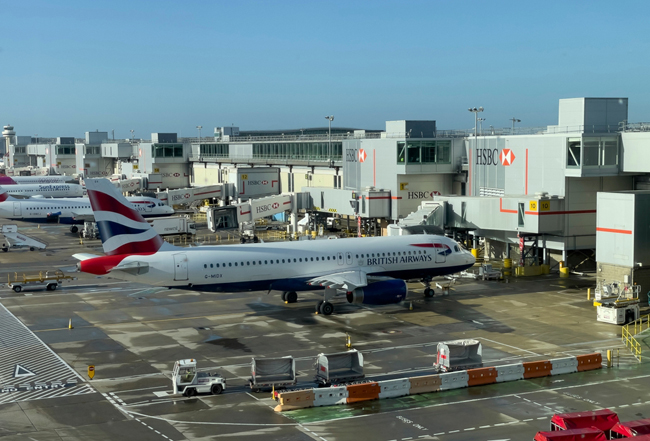The Government’s climate change advisers have warned against continued attempts to expand aviation capacity and thrown down a challenge to its road building plans.
Launching its 2023 report to Parliament on the Government’s progress in reducing emissions, the Climate Change Committee (CCC) said that although publication of the Carbon Budget Delivery Plan (CBDP) had provided new detail on the Government’s plans for Net Zero, ‘policy development continues to be too slow’ and its assessment of the CBDP has raised new concerns.
Outgoing CCC chair Lord Deben said: ‘There is a worrying hesitancy by ministers to lead the country to the next stage of Net Zero commitments.
‘I urge the Government to regroup on Net Zero and commit to bolder delivery. This is a period when pace must be prioritised over perfection.’

Gatwick Airport is planning to increase flights by using its back up runway
The CCC said the list of UK airports proposing to expand capacity continues to grow, ‘counter to the Committee’s advice that there should be no net airport expansion across the UK’. It advised that a national capacity management framework is needed to manage these decisions, with no airport expansions proceeding until this is in place.
It said such a framework should be developed by the Department for Transport in co-operation with the Welsh, Scottish and Northern Irish governments over the next 12 months and should be operational by the end of 2024.
‘After a framework is developed, there should be no net airport expansion unless the carbon-intensity of aviation is outperforming the Government's emissions reduction pathway and can accommodate the additional demand.’
Matt Finch, policy manager at transport and environment UK, said: 'The CCC’s verdict is clear and damning: the Government has dropped the ball on tackling aviation emissions.
'Last year's Jet Zero strategy was effectively a license to pollute: lots of fluffy talk, but scarce on policy details. The CCC has seen through the fluff and has called on the Government to up its game considerably. Unrestrained growth from such a highly polluting sector in the middle of a climate crisis is complete madness.'
On road building, the report says the revised National Policy Statement on National Networks, on which the Government is consulting, is welcome and that its emphasis on the importance of schemes taking ‘all reasonable steps’ to reduce lifetime emissions and taking into account the potential direct and indirect impacts of climate change is positive.
However, it adds that the draft statement needs to be clearer on the network’s role in reducing traffic growth rather than simply meeting the demand in the core scenario within updated National Road Traffic Projections (NRPT) and develop conditions, which can be included in the Roads Investment Strategy 3 process and beyond, that allow schemes to be taken forward ‘only if they meaningfully support cost-effective delivery of net zero and climate adaptation’.
It notes that although various road-building projects have recently been pushed back due to ‘fiscal headwinds’, the Government should launch a more strategic review, similar to the Welsh Roads Review, to assess whether these projects are consistent with its environmental goals.
The committee also made a number of recommendations relating to the take up of electric vehicles (EVs) and advised the Government that it must address ‘long-term fiscal issues’ relating to the decarbonisation of transport.
It noted that the chancellor has confirmed that it has no plans to consider road pricing, without which the ‘consequent absence of central leadership’ risks an inconsistent mix of local schemes and large fiscal shortfalls.
It advised that ministers should also consider the role of Fuel Duty, which remains frozen at Budget 2023, providing ‘a Government subsidy for driving’ and depriving it of money that could have been used to support more sustainable modes.
The committee criticised the failure to provide local transport authorities with advice on how to plan for, calculate and deliver carbon reduction, which was promised in the Government’s Transport Decarbonisation Plan, has not yet been published.
The CCC said the Government must restore the funding settlement for active travel allocated at Spending Review 2021, which was cut in March to just £100m over the next two years. It added that although Active Travel England’s initial funding allocations appear well thought-through with signs of progress, the Government should be looking to build upon these to allocate all local authorities long-term funding to develop and implement active travel but funding cuts will undermine its ability to do this.
The report notes that the £2 bus fare cap has been successful in limiting inflation and encouraging modal shift, adding that it should be made permanent and developed into a wider strategy to reduce the cost of public transport.
On rail, the report notes that rail fare increases for 2023 were capped in line with increases in average earnings, rather than RPI inflation, which halved the increase that would normally have occurred.
However, it also notes that delays to the construction of sections of HS2, also due to ‘fiscal headwinds’ adds to previous negative coverage around changes to the extent of its routes within Northern England.